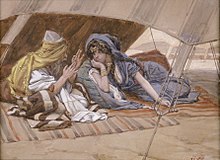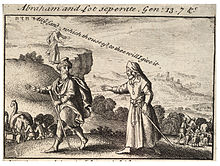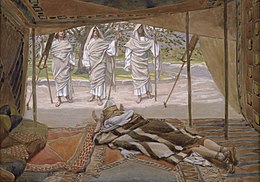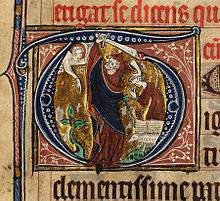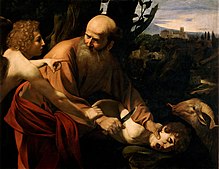| Abraham | |
|---|---|

Abraham Serving the Three Angels, by Rembrandt, 1646
| |
| Information | |
| Family | Abraham's family tree |
| Spouse | |
| Children | |
| Relatives | |
| Birth name | Abram |
| Birthplace | Ur Kaśdim, Mesopotamia |
| Death place | Hebron, Canaan |
| Resting place | Cave of Machpelah |
| Resting place coordinates | 31°31′29″N 35°06′39″E |
| Influenced | Abrahamic religions |
Abraham (né Abram) is the common patriarch of Christianity, Islam, Judaism, and other religions. In Judaism, he is the founding father of the covenant of the pieces, the special relationship between the Hebrews and God; in Christianity, he is the prototype of all believers, Jewish or Gentile; and in Islam he is seen as a link in the chain of prophets that begins with Adam and culminates in Muhammad.
The narrative in the Book of Genesis revolves around the themes of posterity and land. Abraham is called by God to leave the house of his father Terah and settle in the land originally given to Canaan but which God now promises to Abraham and his progeny. Various candidates are put forward who might inherit the land after Abraham; and, while promises are made to Ishmael about founding a great nation, Isaac, Abraham's son by his half-sister Sarah, inherits God's promises to Abraham. Abraham purchases a tomb (the Cave of the Patriarchs) at Hebron to be Sarah's grave, thus establishing his right to the land; and, in the second generation, his heir Isaac is married to a woman from his own kin, thus ruling the Canaanites out of any inheritance. Abraham later marries Keturah and has six more sons; but, on his death, when he is buried beside Sarah, it is Isaac who receives "all Abraham's goods", while the other sons receive only "gifts" (Genesis 25:5–8).
The Abraham story cannot be definitively related to any specific time, and it is widely agreed that the patriarchal age, along with the exodus and the period of the judges, is a late literary construct that does not relate to any period in actual history. A common hypothesis among scholars is that it was composed in the early Persian period (late 6th century BCE) as a result of tensions between Jewish landowners who had stayed in Judah during the Babylonian captivity and traced their right to the land through their "father Abraham", and the returning exiles who based their counter-claim on Moses and the Exodus tradition.
Biblical account
Abraham's Journey from Ur to Canaan, by József Molnár, 1850 (Hungarian National Gallery, Budapest)
Origins and calling
Terah, the ninth in descent from Noah, was the father of three sons: Abram, Nahor, and Haran. The entire family, including grandchildren, lived in Ur of the Chaldees. According to a midrash, Abram worked in Terah's idol shop in his youth. Haran was the father of Lot, and thus Lot was Abram's nephew. Haran died in his native city, Ur of the Chaldees.
Abram married Sarah (Sarai), who was barren. Terah, with Abram, Sarai, and Lot, then departed for Canaan, but settled in a place named Haran, where Terah died at the age of 205.[Genesis 11:27–32]
God had told Abram to leave his country and kindred and go to a land
that he would show him, and promised to make of him a great nation,
bless him, make his name great, bless them that bless him, and curse
them who may curse him.[Genesis 12:1–3]
Abram was 75 years old when he left Haran with his wife Sarai, his
nephew Lot, and the substance and souls that they had acquired, and
traveled to Shechem in Canaan.[Genesis 12:4–6]
Abraham's Counsel to Sarai, watercolor by James Tissot, c. 1900 (Jewish Museum, New York)
Sarai
There was a severe famine in the land of Canaan, so that Abram and Lot and their households, traveled to Egypt. On the way Abram told Sarai to say that she was his sister, so that the Egyptians would not kill him.[Genesis 12:10–13] When they entered Egypt, the Pharaoh's officials praised Sarai's beauty to Pharaoh,
and they took her into the palace and gave Abram goods in exchange. God
afflicted Pharaoh and his household with plagues, which led Pharaoh to
try to find out what was wrong.[Genesis 12:14–17] Upon discovering that Sarai was a married woman, Pharaoh demanded that Abram and Sarai leave.[Genesis 12:18–20]
Abram and Lot separate
Abraham and Lot separate. Gen: 13.7 &.c, etching by Wenceslaus Hollar, 17th century (Thomas Fisher Rare Book Library, Toronto)
When they came back to the Bethel and Hai area, Abram's and Lot's
sizable herds occupied the same pastures. This became a problem for the
herdsmen who were assigned to each family's cattle. The conflicts
between herdsmen had become so troublesome that Abram suggested that Lot
choose a separate area, either on the left hand or on the right hand,
that there be no conflict amongst brethren. Lot chose to go eastward to
the plain of Jordan where the land was well watered everywhere as far as Zoar, and he dwelled in the cities of the plain toward Sodom. Abram went south to Hebron and settled in the plain of Mamre, where he built another altar to worship God.
Chedorlaomer
Meeting of Abraham and Melchizedek, canvas by Dieric Bouts the Elder, c. 1464–1467
During the rebellion of the Jordan River cities against Elam,[Genesis 14:1–9] Abram's nephew, Lot, was taken prisoner along with his entire household by the invading Elamite forces. The Elamite army came to collect the spoils of war, after having just defeated the king of Sodom's armies.[Genesis 14:8–12] Lot and his family, at the time, were settled on the outskirts of the Kingdom of Sodom which made them a visible target.[Genesis 13:12]
One person who escaped capture came and told Abram what happened.
Once Abram received this news, he immediately assembled 318 trained
servants. Abram's force headed north in pursuit of the Elamite army, who
were already worn down from the Battle of Siddim. When they caught up with them at Dan,
Abram devised a battle plan by splitting his group into more than one
unit, and launched a night raid. Not only were they able to free the
captives, Abram's unit chased and slaughtered the Elamite King Chedorlaomer at Hobah, just north of Damascus. They freed Lot, as well as his household and possessions, and recovered all of the goods from Sodom that had been taken.[Genesis 14:13–16]
Upon Abram's return, Sodom's king came out to meet with him in the Valley of Shaveh, the "king's dale". Also, Melchizedek king of Salem (Jerusalem), a priest of God Most High, brought out bread and wine and blessed Abram and God. Abram then gave Melchizedek a tenth
of everything. The king of Sodom then offered to let Abram keep all the
possessions if he would merely return his people. Abram refused any
deal from the king of Sodom, other than the share to which his allies
were entitled.[Genesis 14:17–24]
The vision of the Lord directing Abraham to count the stars, woodcut by Julius Schnorr von Carolsfeld from a 1860 Bible in Pictures edition.
Covenant of the pieces
The voice of the Lord came to Abram in a vision and repeated the
promise of the land and descendants as numerous as the stars. Abram and
God made a covenant ceremony, and God told of the future bondage of
Israel in Egypt. God described to Abram the land that his offspring
would claim: the land of the Kenites, Kenizzites, Kadmonites, Hittites,
Perizzites, Rephaims, Amorites, Canaanites, Girgashites, and Jebusites.[Genesis 15:1–21]
Hagar
Abram and Sarai tried to make sense of how he would become a
progenitor of nations, because after 10 years of living in Canaan, no
child had been born. Sarai then offered her Egyptian handmaiden, Hagar, to Abram with the intention that she would bear him a son.
After Hagar found she was pregnant, she began to despise her
mistress, Sarai. Sarai responded by mistreating Hagar, and Hagar fled
into the wilderness. An angel spoke with Hagar at the fountain on the
way to Shur.
He instructed her to return to the camp of Abram, and that her son
would be "a wild ass of a man; his hand shall be against every man, and
every man's hand against him; and he shall dwell in the face of all his
brethren." She was told to call her son Ishmael. Hagar then called God who spoke to her "El-roi",
("Thou God seest me:" KJV). From that day onward, the well was called
Beer-lahai-roi, ("The well of him that liveth and seeth me." KJV
margin). She then did as she was instructed by returning to her mistress
in order to have her child. Abram was 86 years of age when Ishmael was
born.[Genesis 16:4–16]
Sarah
Thirteen years later, when Abram was 99 years of age, God declared Abram's new name: "Abraham" – "a father of many nations".[Genesis 17:5] Abraham then received the instructions for the covenant, of which circumcision was to be the sign.[Genesis 17:10–14]
God declared Sarai's new name: "Sarah", blessed her, and told Abraham, "I will give thee a son also of her".[Genesis 17:15–16] Abraham laughed, and "said in his heart, 'Shall a child be born unto him that is a hundred years old? and shall Sarah, that is ninety years old, bear?'"[Genesis 17:17]
Immediately after Abraham's encounter with God, he had his entire
household of men, including himself (age 99) and Ishmael (age 13),
circumcised.[Genesis 17:22–27]
Three visitors
Abraham and the Three Angels, watercolor by James Tissot, c. 1896–1902
Not long afterward, during the heat of the day, Abraham had been sitting at the entrance of his tent by the terebinths of Mamre. He looked up and saw three men in the presence of God. Then he ran and bowed
to the ground to welcome them. Abraham then offered to wash their feet
and fetch them a morsel of bread, to which they assented. Abraham rushed
to Sarah's
tent to order cakes made from choice flour, then he ordered a
servant-boy to prepare a choice calf. When all was prepared, he set
curds, milk and the calf before them, waiting on them, under a tree, as
they ate.[Genesis 18:1–8]
One of the visitors told Abraham that upon his return next year,
Sarah would have a son. While at the tent entrance, Sarah overheard what
was said and she laughed to herself about the prospect of having a
child at their ages. The visitor inquired of Abraham why Sarah laughed
at bearing a child at her age, as nothing is too hard for God.
Frightened, Sarah denied laughing.
Abraham's plea
Abraham Sees Sodom in Flames, watercolor by James Tissot, c. 1896–1902
After eating, Abraham and the three visitors got up. They walked over
to the peak that overlooked the 'cities of the plain' to discuss the
fate of Sodom and Gomorrah
for their detestable sins that were so great, it moved God to action.
Because Abraham's nephew was living in Sodom, God revealed plans to
confirm and judge these cities. At this point, the two other visitors
left for Sodom. Then Abraham turned to God and pleaded decrementally
with Him (from fifty persons to less) that "if there were at least ten
righteous men found in the city, would not God spare the city?" For the
sake of ten righteous people, God declared that he would not destroy the
city.[Genesis 18:17–33]
When the two visitors got to Sodom to conduct their report, they
planned on staying in the city square. However, Abraham's nephew, Lot,
met with them and strongly insisted that these two "men" stay at his
house for the night. A rally of men stood outside of Lot's home and
demanded that Lot bring out his guests so that they may "know" (v.5)
them. However, Lot objected and offered his virgin daughters who had not
"known" (v.8) man to the rally of men instead. They rejected that
notion and sought to break down Lot's door to get to his male guests,[Genesis 19:1–9] thus confirming the wickedness of the city and portending their imminent destruction.[Genesis 19:12–13]
Early the next morning, Abraham went to the place where he stood
before God. He "looked out toward Sodom and Gomorrah" and saw what
became of the cities of the plain, where not even "ten righteous"
(v.18:32) had been found, as "the smoke of the land went up as the smoke
of a furnace."[Genesis 19:27–29]
Abimelech
The Caravan of Abraham, watercolor by James Tissot, before 1903 (Jewish Museum, New York)
Abraham settled between Kadesh and Shur in the land of the Philistines. While he was living in Gerar, Abraham openly claimed that Sarah was his sister. Upon discovering this news, King Abimelech
had her brought to him. God then came to Abimelech in a dream and
declared that taking her would result in death because she was a man's
wife. Abimelech had not laid hands on her, so he inquired if he would
also slay a righteous nation, especially since Abraham had claimed that
he and Sarah were siblings. In response, God told Abimelech that he did
indeed have a blameless heart and that is why he continued to exist.
However, should he not return the wife of Abraham back to him, God would
surely destroy Abimelech and his entire household. Abimelech was
informed that Abraham was a prophet who would pray for him.[Genesis 20:1–7]
Early next morning, Abimelech informed his servants of his dream
and approached Abraham inquiring as to why he had brought such great
guilt upon his kingdom. Abraham stated that he thought there was no fear
of God in that place, and that they might kill him for his wife. Then
Abraham defended what he had said as not being a lie at all: "And yet
indeed she is my sister; she is the daughter of my father, but not the daughter of my mother; and she became my wife."[Genesis 20:12]
Abimelech returned Sarah to Abraham, and gave him gifts of sheep, oxen,
and servants; and invited him to settle wherever he pleased in
Abimelech's lands. Further, Abimelech gave Abraham a thousand pieces of
silver to serve as Sarah's vindication before all. Abraham then prayed
for Abimelech and his household, since God had stricken the women with
infertility because of the taking of Sarah.[Genesis 20:8–18]
After living for some time in the land of the Philistines, Abimelech and Phicol,
the chief of his troops, approached Abraham because of a dispute that
resulted in a violent confrontation at a well. Abraham then reproached
Abimelech due to his Philistine servant's aggressive attacks and the
seizing of Abraham's well.
Abimelech claimed ignorance of the incident. Then Abraham offered a
pact by providing sheep and oxen to Abimelech. Further, to attest that
Abraham was the one who dug the well, he also gave Abimelech seven ewes
for proof. Because of this sworn oath, they called the place of this
well: Beersheba. After Abimelech and Phicol headed back to Philistia, Abraham planted a grove in Beersheba and called upon "the name of the LORD, the everlasting God."[Genesis 21:22–34]
Isaac
Abraham about to sacrifice Isaac, from an East Anglian missal, c. 1315 (National Library of Wales, Aberystwyth)
Sacrifice of Isaac, by Caravaggio, c. 1603 (Uffizi, Florence)
As had been prophesied in Mamre the previous year,[Genesis 17:21]
Sarah became pregnant and bore a son to Abraham, on the first
anniversary of the covenant of circumcision. Abraham was "an hundred
years old", when his son whom he named Isaac was born; and he
circumcised him when he was eight days old.[Genesis]
For Sarah, the thought of giving birth and nursing a child, at such an
old age, also brought her much laughter, as she declared, "God hath made
me to laugh, so that all who hear will laugh with me."[Genesis]
Isaac continued to grow and on the day he was weaned, Abraham held a
great feast to honor the occasion. During the celebration, however,
Sarah found Ishmael mocking; an observation that would begin to clarify
the birthright of Isaac.[Genesis 21:8–13]
Ishmael
Ishmael was fourteen years old when Abraham's son Isaac
was born to Sarah. When she found Ishmael teasing Isaac, Sarah told
Abraham to send both Ishmael and Hagar away. She declared that Ishmael
would not share in Isaac's inheritance. Abraham was greatly distressed
by his wife's words and sought the advice of his God. God told Abraham
not to be distressed but to do as his wife commanded. God reassured
Abraham that "in Isaac shall seed be called to thee."[Genesis 21:12] He also said that Ishmael would make a nation, "because he is thy seed".[Genesis 21:9–13]
Early the next morning, Abraham brought Hagar and Ishmael out
together. He gave her bread and water and sent them away. The two
wandered in the wilderness of Beersheba
until her bottle of water was completely consumed. In a moment of
despair, she burst into tears. After God heard the boy's voice, an angel of the Lord
confirmed to Hagar that he would become a great nation, and will be
"living on his sword". A well of water then appeared so that it saved
their lives. As the boy grew, he became a skilled archer living in the wilderness of Paran. Eventually his mother found a wife for Ishmael from her home country, the land of Egypt.[Genesis 21:14–21]
Binding of Isaac
The Angel Hinders the Offering of Isaac, by Rembrandt, 1635 (Hermitage Museum, Saint Petersburg)
At some point in Isaac's youth, Abraham was commanded by God to offer his son up as a sacrifice in the land of Moriah.
The patriarch traveled three days until he came to the mount that God
told him of. He then commanded the servants to remain while he and Isaac
proceeded alone into the mount. Isaac carried the wood upon which he
would be sacrificed. Along the way, Isaac asked his father where the
animal for the burnt offering was, to which Abraham replied "God will
provide himself a lamb for a burnt offering". Just as Abraham was about
to sacrifice his son, he was interrupted by the angel of the Lord, and
he saw behind him a "ram caught in a thicket by his horns", which he
sacrificed instead of his son. For his obedience he received another
promise of numerous descendants and abundant prosperity. After this
event, Abraham went to Beersheba.[Genesis 22:1–19]
Later years
Sarah died, and Abraham buried her in the Cave of the Patriarchs (the "cave of Machpelah"), near Hebron which he had purchased along with the adjoining field from Ephron the Hittite.[Genesis 23:1–20] After the death of Sarah, Abraham took another wife, a concubine named Keturah, by whom he had six sons: Zimran, Jokshan, Medan, Midian, Ishbak, and Shuah.[Genesis 25:1–6]
According to the Bible, reflecting the change of his name to "Abraham"
meaning "a father of many nations", Abraham is considered to be the
progenitor of many nations mentioned in the Bible, among others the Israelites, Ishmaelites,[Genesis 25:12–18] Edomites,[Genesis 36:1–43]) Amalekites,[Genesis 36:12–16] Kenizzites,[Genesis 36:9–16] Midianites and Assyrians,[Genesis 25:1–5] and through his nephew Lot he was also related to the Moabites and Ammonites.[Genesis 19:35–38] Abraham lived to see his son marry Rebekah, (and to see the birth of his twin grandsons Jacob and Esau). He died at age 175, and was buried in the cave of Machpelah by his sons Isaac and Ishmael.[Genesis 25:7–10][1 Chronicles 1:32]
Historicity and origins
Historicity
Abraham's well at Beersheba
In the early and middle 20th century, leading archaeologists such as William F. Albright and biblical scholars such as Albrecht Alt believed that the patriarchs and matriarchs were either real individuals or believable composites of people who lived in the "patriarchal age",
the 2nd millennium BCE. But, in the 1970s, new arguments concerning
Israel's past and the biblical texts challenged these views; these
arguments can be found in Thomas L. Thompson's The Historicity of the Patriarchal Narratives (1974), and John Van Seters' Abraham in History and Tradition
(1975). Thompson, a literary scholar, based his argument on archaeology
and ancient texts. His thesis centered on the lack of compelling
evidence that the patriarchs lived in the 2nd millennium BCE, and noted
how certain biblical texts reflected first millennium conditions and
concerns. Van Seters examined the patriarchal stories and argued that
their names, social milieu, and messages strongly suggested that they
were Iron Age creations.
By the beginning of the 21st century, archaeologists had given up hope
of recovering any context that would make Abraham, Isaac or Jacob
credible historical figures.
Origins of the narrative
Abraham's name is apparently very ancient, as the tradition found in
Genesis no longer understands its original meaning (probably "Father is
exalted" – the meaning offered in Genesis 17:5, "Father of a multitude",
is a popular etymology). The story, like those of the other patriarchs, most likely had a substantial oral prehistory. At some stage the oral traditions became part of the written tradition of the Pentateuch; a majority of scholars believe this stage belongs to the Persian period, roughly 520–320 BCE. The mechanisms by which this came about remain unknown, but there are currently two important hypotheses.
The first, called Persian Imperial authorisation, is that the
post-Exilic community devised the Torah as a legal basis on which to
function within the Persian Imperial system; the second is that the
Pentateuch was written to provide the criteria for determining who would
belong to the post Exilic Jewish community and to establish the power
structures and relative positions of its various groups, notably the
priesthood and the lay "elders".
Nevertheless, the completion of the Torah and its elevation to
the centre of post-Exilic Judaism was as much or more about combining
older texts as writing new ones – the final Pentateuch was based on
existing traditions. In Ezekiel 33:24,
written during the Exile (i.e., in the first half of the 6th century
BCE), Ezekiel, an exile in Babylon, tells how those who remained in
Judah are claiming ownership of the land based on inheritance from
Abraham; but the prophet tells them they have no claim because they do
not observe Torah. Isaiah 63:16 similarly testifies of tension between the people of Judah and the returning post-Exilic Jews (the "gôlâ"), stating that God is the father of Israel and that Israel's history begins with the Exodus and not with Abraham. The conclusion to be inferred from this and similar evidence (e.g., Ezra–Nehemiah),
is that the figure of Abraham must have been preeminent among the great
landowners of Judah at the time of the Exile and after, serving to
support their claims to the land in opposition to those of the returning
exiles.
Religious traditions
Abraham
| |
|---|---|
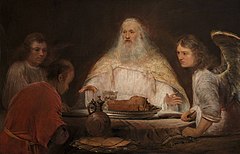
Abraham and the Angels, by Aert de Gelder, c. 1680–85 (Museum Boijmans Van Beuningen, Rotterdam)
| |
| First Patriarch | |
| Venerated in | |
| Feast | 9 October – Roman Catholicism |
Overview
Abraham is given a high position of respect in three major world faiths, Judaism, Christianity and Islam.
In Judaism he is the founding father of the Covenant, the special
relationship between the Jewish people and God – leading to the belief
that the Jews are the Chosen People of God. In Christianity, the Apostle Paul taught that Abraham's faith in God – preceding the Mosaic law – made him the prototype of all believers, circumcised and uncircumcised. In Islam, the prophet Muhammad claimed Abraham, whose submission to God constituted Islam, was a "believer before the fact" and undercut Jewish claims to an exclusive relationship with God and the Covenant.
Judaism
In Jewish tradition, Abraham is called Avraham Avinu (אברהם
אבינו), "our father Abraham," signifying that he is both the biological
progenitor of the Jews and the father of Judaism, the first Jew. His story is read in the weekly Torah reading portions, predominantly in the parashot: Lech-Lecha (לֶךְ-לְךָ), Vayeira (וַיֵּרָא), Chayei Sarah (חַיֵּי שָׂרָה), and Toledot (תּוֹלְדֹת).
In Jewish legend, God created heaven and earth for the sake of the merits of Abraham. After the deluge, Abraham was the only one among the pious who solemnly swear never forsaking God, and studied in house of Noah and Shem to learn about "Ways of God," and continuing the line of High Priest from Noah and Shem, then he descended the office to Levi and his seed forever. Before leaving his fathers' land, Abraham was miraculously saved from the fiery furnace of Nimrod following his brave action of breaking the idols of the Chaldeans into pieces.
During his sojourning in Canaan, Abraham was accustomed to extend
hospitality to travelers and strangers and taught how to praise God also
knowledge of God to those who had received his kindness.
Besides Isaac and Jacob, he is the one whose name would appear united with God, as God in Judaism was called Elohei Abraham, Elohei Yitzchaq ve Elohei Ya`aqob ("God of Abraham, God of Isaac, and God of Jacob") and never the God of any one else. He was also mentioned as the father of thirty nations.
Christianity
Abraham does not loom so large in Christianity as he does in Judaism and Islam. It is Jesus as the Jewish Messiah who is central to Christianity, and the idea of a divine Messiah is what separates Christianity from the other two religions. In Romans
4, Abraham's merit is less his obedience to the divine will than his
faith in God's ultimate grace; this faith provides him the merit for God
having chosen him for the covenant, and the covenant becomes one of
faith, not obedience.
The Roman Catholic Church calls Abraham "our father in Faith" in the Eucharistic prayer of the Roman Canon, recited during the Mass (see Abraham in the Catholic liturgy). He is also commemorated in the calendars of saints of several denominations: on 20 August by the Maronite Church, 28 August in the Coptic Church and the Assyrian Church of the East (with the full office for the latter), and on 9 October by the Roman Catholic Church and the Lutheran Church–Missouri Synod. In the introduction to his 15th-century translation of the Golden Legend's account of Abraham, William Caxton noted that this patriarch's life was read in church on Quinquagesima Sunday.
He is the patron saint of those in the hospitality industry. The Eastern Orthodox Church commemorates him as the "Righteous Forefather Abraham", with two feast days in its liturgical calendar. The first time is on 9 October (for those churches which follow the traditional Julian Calendar, 9 October falls on 22 October of the modern Gregorian Calendar),
where he is commemorated together with his nephew "Righteous Lot". The
other is on the "Sunday of the Forefathers" (two Sundays before
Christmas), when he is commemorated together with other ancestors of Jesus. Abraham is also mentioned in the Divine Liturgy of Saint Basil the Great, just before the Anaphora, and Abraham and Sarah are invoked in the prayers said by the priest over a newly married couple.
Islam
Islam regards Abraham as a link in the chain of prophets that begins with Adam and culminates in Muhammad.
Ibrāhīm is mentioned in 35 chapters of the Quran, more often than any other biblical personage apart from Moses. He is called both a hanif (monotheist) and muslim (one who submits), and Muslims regard him as a prophet and patriarch, the archetype of the perfect Muslim, and the revered reformer of the Kaaba in Mecca. Islamic traditions consider Ibrāhīm (Abraham) the first Pioneer of Islam (which is also called millat Ibrahim, the "religion of Abraham"), and that his purpose and mission throughout his life was to proclaim the Oneness of God.
In Islam, Abraham holds an exalted position among the major prophets
and he is referred to as "Ibrahim Khalilullah", meaning "Abraham the
Beloved of Allah".
Besides Ishaq and Yaqub, Ibrahim is among the most honorable and the most excellent men in sight of God. Ibrahim was also mentioned in Quran as "Father of Muslims" and the role model for the community.
In the arts
Painting and sculpture
Paintings on the life of Abraham tend to focus on only a few
incidents: the sacrifice of Isaac; meeting Melchizedek; entertaining the
three angels; Hagar in the desert; and a few others. Additionally, Martin O'Kane, a professor of Biblical Studies, writes that the parable of Lazarus resting in the "Bosom of Abraham", as described in the Gospel of Luke, became an iconic image in Christian works.
According to O'Kane, artists often chose to divert from the common
literary portrayal of Lazarus sitting next to Abraham at a banquet in
Heaven and instead focus on the "somewhat incongruous notion of Abraham,
the most venerated of patriarchs, holding a naked and vulnerable child
in his bosom". Several artists have been inspired by the life of Abraham, including Albrecht Dürer (1471–1528), Caravaggio (1573–1610), Donatello, Raphael, Philip van Dyck (Dutch painter, 1680–1753), and Claude Lorrain (French painter, 1600–1682). Rembrandt (Dutch, 1606–1669) created at least seven works on Abraham, Peter Paul Rubens (1577–1640) did several, Marc Chagall did at least five on Abraham, Gustave Doré (French illustrator, 1832–1883) did six, and James Tissot (French painter and illustrator, 1836–1902) did over twenty works on the subject.
16th century plaster cast of a late Roman era Sacrifice of Isaac. The hand of God originally came down to restrain Abraham's knife (both are now missing).
The Sarcophagus of Junius Bassus
depicts a set of biblical stories, including Abraham about to sacrifice
Isaac. These sculpted scenes are on the outside of a marble Early Christian sarcophagus used for the burial of Junius Bassus.
He died in 359. This sarcophagus has been described as "probably the
single most famous piece of early Christian relief sculpture." The sarcophagus was originally placed in or under Old St. Peter's Basilica,
was rediscovered in 1597, and is now below the modern basilica in the
Museo Storico del Tesoro della Basilica di San Pietro (Museum of St. Peter's Basilica) in the Vatican.
The base is approximately 4 × 8 × 4 feet. The Old Testament scenes
depicted were chosen as precursors of Christ's sacrifice in the New Testament, in an early form of typology. Just to the right of the middle is Daniel in the lion's den and on the left is Abraham about to sacrifice Isaac.
George Segal created figural sculptures by molding plastered gauze strips over live models in his 1987 work Abraham's Farewell to Ishmael.
The human condition was central to his concerns, and Segal used the Old
Testament as a source for his imagery. This sculpture depicts the
dilemma faced by Abraham when Sarah demanded that he expel Hagar and
Ishmael. In the sculpture, the father's tenderness, Sarah's rage, and
Hagar's resigned acceptance portray a range of human emotions. The
sculpture was donated to the Miami Art Museum after the artist's death
in 2000.
Christian iconography
Usually Abraham can be identified by the context of the image – the meeting with Melchizedek, the three visitors, or the sacrifice of Isaac. In solo portraits a sword or knife may be used as his attribute, as in this statue by Gian Maria Morlaiter or this painting by Lorenzo Monaco. He always wears a gray or white beard.
As early as the beginning of the 3rd century, Christian art followed Christian typology
in making the sacrifice of Isaac a foreshadowing of Christ's sacrifice
on the cross and its memorial in the sacrifice of the Mass. See for
example this 11th-century Christian altar engraved with Abraham's and other sacrifices taken to prefigure that of Christ in the Eucharist.
Some early Christian writers interpreted the three visitors as the triune God. Thus in Santa Maria Maggiore, Rome, a 5th-century mosaic
portrays only the visitors against a gold ground and puts
semitransparent copies of them in the "heavenly" space above the scene.
In Eastern Orthodox art the visit is the chief means by which the
Trinity is pictured (example). Some images do not include Abraham and Sarah, like Andrei Rublev's Trinity, which shows only the three visitors as beardless youths at a table.
Literature
Fear and Trembling (original Danish title: Frygt og Bæven) is an influential philosophical work by Søren Kierkegaard, published in 1843 under the pseudonym Johannes de silentio (John the Silent). Kierkegaard wanted to understand the anxiety that must have been present in Abraham when God asked him to sacrifice his son.
Music
In 1681, Marc-Antoine Charpentier released a Dramatic motet Sacrificim Abrahae H 402 - 402 a - 402 b, for soloists, chorus, doubling instruments and bc. Sébastien de Brossard released a cantate Abraham (date unknown).
In 1994, Steve Reich released an opera named The Cave. The title refers to the Cave of the Patriarchs.
The narrative of the opera is based on the story of Abraham and his
immediate family as it is recounted in the various religious texts, and
as it is understood by individual people from different cultures and
religious traditions.
Bob Dylan's "Highway 61 Revisited" is the title track for his 1965 album Highway 61 Revisited. In 2004, Rolling Stone magazine ranked the song as number 364 in their 500 Greatest Songs of All Time.
The song has five stanzas. In each stanza, someone describes an unusual
problem that is ultimately resolved on Highway 61. In Stanza 1, God tells Abraham to "kill me a son".
God wants the killing done on Highway 61. Abram, the original name of
the biblical Abraham, is also the name of Dylan's own father.


